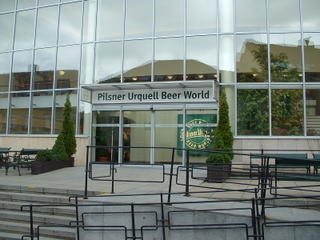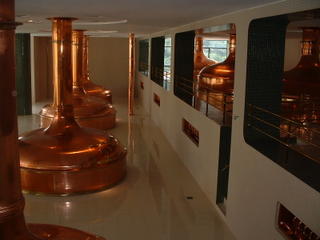Brewery Review: Pilsner Urquell Beer World
Pilsner Urquell markets itself as the world's first golden beer, but it could just as easily lay claim to having the world's finest brewery tour.
A trip to Plzen, about 1 hour, 45 minutes by train from Prague, should be a required pilgrimage for any lover of excellent beer. After passing through the Jubilee Gate, erected in 1892 to commemorate the brewery's 50th anniversary and pictured to this day on the Pilsner Urquell logo, a mere 120 Kc (about $5, half-price for students) buys you a 70-minute excursion through the history of Pilsner Urquell and an education in the art of brewing.

While the tour, like the brewery, bears the hallmarks of modernity (bright, inviting visitors center, state-of-the art films screened by DVD projectors, shiny new stainless steel brewing kettles), it preserves the historical side of the beer and the brewery, which makes for a one-of-a-kind experience.

Though the 10-minute film that commences the tour is perhaps a little campy (though a truly devoted beer aficionado might get choked up at the exaggerated drama to it), it does provide an interesting overview of more than 160 years of brewing history in Plzen. There are certainly elements that are notably absent from the film (the complicated Czech-German relationship that surrounded the first century or so of Pilsner Urquell's existence, like the fact that this most famous Czech beer is sold under its German name), but those are chiefly of interest to historians and other academic types, and don't impair the overall quality.
From the film theater, the tour moves to the brewhouse, beginning with an explanation of how Pilsner Urquell is made, aided by a colorful diagram (unfortunately it's only in Czech, though the guide describes the whole process in the language of the tour).

Then there's the obligatory visit to the ultramodern part of the brewhouse where the enormous kettles crank out thousands of liters of liquid gold every day. The most recent portion of the brewhouse was completed but a year ago.

And as if to emphasize the contrast, nearby is the original copper kettle used to brew Pilsner Urquell, thoroughly greened with age.

After that brief diversion through modern brewing, the tour ventures back in time, to the parts of the original brewery that have been preserved for posterity. Enormous cellars are naturally cool and helped to keep the enormous wooden barrels chilled in the earlier years of production.

You can even see the beer fermenting in wooden barrels via the old method.

However, the real payoff of the tour, and what makes the trek to Plzen worthwhile, is the tasting.
Generally, you get a free taste of the featured product at a brewery tour. It's normally worth the price of admission just to get the beer at the source, which is always the best place to have beer (witness Guinness and Ireland).
But most brewery tours don't give you a blast from the past, something truly vintage. As in, a glass of the stuff produced via the old methods, and served unfiltered and unpasteurized.

It's cloudier than usual, and has a yeastier taste, which makes for complex flavors. But it's quite good, and a variety of Pilsner Urquell you literally cannot find anywhere else in the world, with one exception. More on that later.
After exiting the cellar, the final stop is in a replica of the cooper's workshop, a sort of life-sized diorama featuring the real tools used by coopers at the Pilsner Urquell brewery in previous times (the brewery still employs a few coopers, but beer storage is all done in metal containers these days). It's a nice way to round off the trip into brewing's bygone days.
In addition to the brewery tour, Pilsner Urquell also operates the Brewery Museum, about a mile or so from the brewery near the city center. The museum is housed in a building where one of the original Pilsner Urquell brewers worked, and has a nice collection of artifacts and displays that chronicle the history of brewing in the world, in Plzen, and at Pilsner Urquell. Unfortunately, photography isn't allowed.
However, appended to the museum is a pub, Na Parkanu, recently reconstructed, which is the only place outside of the brewery tour where you can find unfiltered Pilsner Urquell. The fare included standard Czech pub grub, at fairly reasonable prices, and is a nice way to finish off a visit to Plzen, washed down with some of that liquid gold, no less.
What's nice about the Pilsner Urquell brewery is also that it's not nearly so heavily trafficked with tourists (particularly the obnoxious British men in town for stag parties) that you find at breweries in Prague.
All in all, it's an outstanding presentation of a unique and pioneering beer, done in a way that preserves its rich heritage, and worth a day trip from Prague.
A trip to Plzen, about 1 hour, 45 minutes by train from Prague, should be a required pilgrimage for any lover of excellent beer. After passing through the Jubilee Gate, erected in 1892 to commemorate the brewery's 50th anniversary and pictured to this day on the Pilsner Urquell logo, a mere 120 Kc (about $5, half-price for students) buys you a 70-minute excursion through the history of Pilsner Urquell and an education in the art of brewing.

While the tour, like the brewery, bears the hallmarks of modernity (bright, inviting visitors center, state-of-the art films screened by DVD projectors, shiny new stainless steel brewing kettles), it preserves the historical side of the beer and the brewery, which makes for a one-of-a-kind experience.

Though the 10-minute film that commences the tour is perhaps a little campy (though a truly devoted beer aficionado might get choked up at the exaggerated drama to it), it does provide an interesting overview of more than 160 years of brewing history in Plzen. There are certainly elements that are notably absent from the film (the complicated Czech-German relationship that surrounded the first century or so of Pilsner Urquell's existence, like the fact that this most famous Czech beer is sold under its German name), but those are chiefly of interest to historians and other academic types, and don't impair the overall quality.
From the film theater, the tour moves to the brewhouse, beginning with an explanation of how Pilsner Urquell is made, aided by a colorful diagram (unfortunately it's only in Czech, though the guide describes the whole process in the language of the tour).

Then there's the obligatory visit to the ultramodern part of the brewhouse where the enormous kettles crank out thousands of liters of liquid gold every day. The most recent portion of the brewhouse was completed but a year ago.

And as if to emphasize the contrast, nearby is the original copper kettle used to brew Pilsner Urquell, thoroughly greened with age.

After that brief diversion through modern brewing, the tour ventures back in time, to the parts of the original brewery that have been preserved for posterity. Enormous cellars are naturally cool and helped to keep the enormous wooden barrels chilled in the earlier years of production.

You can even see the beer fermenting in wooden barrels via the old method.

However, the real payoff of the tour, and what makes the trek to Plzen worthwhile, is the tasting.
Generally, you get a free taste of the featured product at a brewery tour. It's normally worth the price of admission just to get the beer at the source, which is always the best place to have beer (witness Guinness and Ireland).
But most brewery tours don't give you a blast from the past, something truly vintage. As in, a glass of the stuff produced via the old methods, and served unfiltered and unpasteurized.

It's cloudier than usual, and has a yeastier taste, which makes for complex flavors. But it's quite good, and a variety of Pilsner Urquell you literally cannot find anywhere else in the world, with one exception. More on that later.
After exiting the cellar, the final stop is in a replica of the cooper's workshop, a sort of life-sized diorama featuring the real tools used by coopers at the Pilsner Urquell brewery in previous times (the brewery still employs a few coopers, but beer storage is all done in metal containers these days). It's a nice way to round off the trip into brewing's bygone days.
In addition to the brewery tour, Pilsner Urquell also operates the Brewery Museum, about a mile or so from the brewery near the city center. The museum is housed in a building where one of the original Pilsner Urquell brewers worked, and has a nice collection of artifacts and displays that chronicle the history of brewing in the world, in Plzen, and at Pilsner Urquell. Unfortunately, photography isn't allowed.
However, appended to the museum is a pub, Na Parkanu, recently reconstructed, which is the only place outside of the brewery tour where you can find unfiltered Pilsner Urquell. The fare included standard Czech pub grub, at fairly reasonable prices, and is a nice way to finish off a visit to Plzen, washed down with some of that liquid gold, no less.
What's nice about the Pilsner Urquell brewery is also that it's not nearly so heavily trafficked with tourists (particularly the obnoxious British men in town for stag parties) that you find at breweries in Prague.
All in all, it's an outstanding presentation of a unique and pioneering beer, done in a way that preserves its rich heritage, and worth a day trip from Prague.

0 Comments:
Okomentovat
<< Home